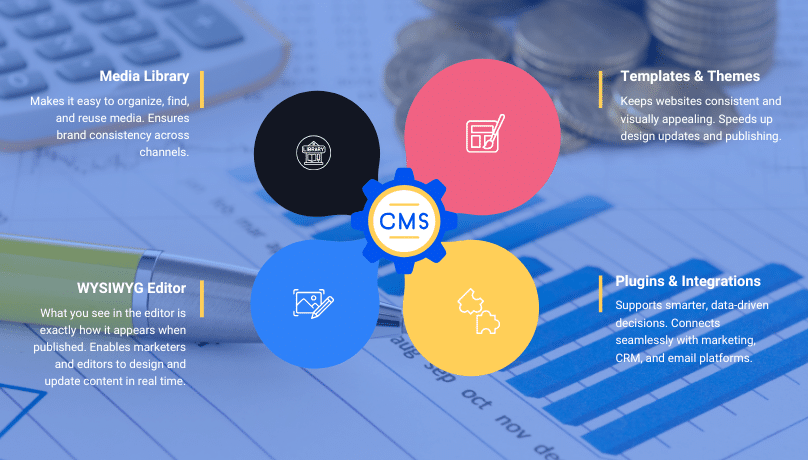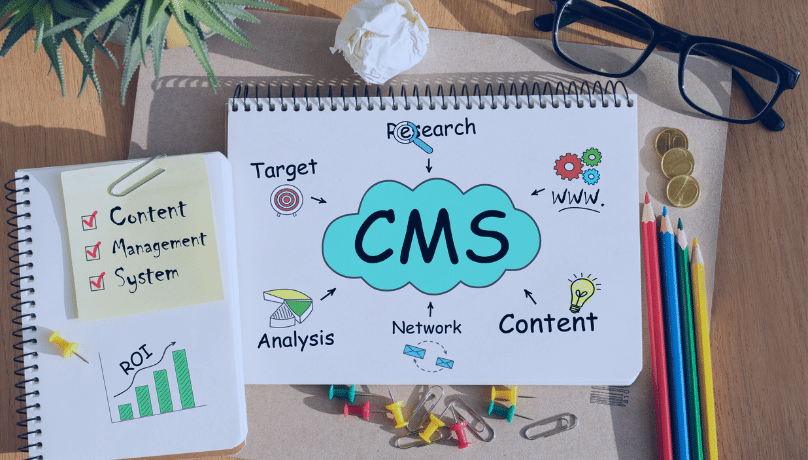









Did you know that over 70% of digital projects fail to meet their goals, not because of bad ideas, but because of poor content management? In today’s fast-moving digital world, businesses are producing more content than ever, and those that can’t organize, update, and deliver it efficiently risk falling behind their competitors.
This is where Content Management Software (CMS) becomes essential. A modern CMS empowers teams to create, manage, and distribute digital content seamlessly, ensuring consistency, agility, and brand control across every channel. As part of a broader digital transformation strategy, CMS platforms help organizations work smarter, automate workflows, and turn their content into a lasting competitive advantage.
Content management software separates content from design. This structure allows marketing, design, and technical teams to work independently while staying aligned. Its core purpose is to:
For example, small business owners can upload new images, publish blogs, or edit product pages instantly, no developer required. This independence saves time and keeps marketing activities running smoothly.
Modern Content management software brings together simplicity and flexibility in one platform, offering all the tools teams need to manage digital experiences effectively. A CMS typically includes a visual WYSIWYG (What You See Is What You Get) editor that allows users to create and format text, images, and videos easily without technical skills. In other words, what you see on the editing screen is exactly how the content will appear when published, making it simple for marketers and editors to design pages, add visuals, and adjust layouts in real time without relying on developers.
The built-in media library helps teams organize and reuse visual assets such as images, videos, and documents from a single centralized location. Meanwhile, templates and themes allow quick design adjustments without altering any code, keeping websites visually consistent and easy to update. Finally, a CMS can be extended with plugins and integrations that add SEO optimization, automation, and analytics features. Together, these capabilities enable organizations to make smarter, data-driven decisions and continuously improve content quality and marketing performance.

There is no single Content management software that fits every business, but several proven platforms have become industry leaders.
First, WordPress remains the world’s most popular CMS, powering more than 43% of all websites. Its open-source ecosystem, vast plugin library, and user-friendly interface make it ideal for blogs, corporate sites, and marketing teams that value flexibility.
Second, Joomla! and Drupal are preferred by large enterprises and government organizations that require advanced customization, multilingual support, and complex permission structures. They are well-suited for organizations managing large-scale digital ecosystems.
Third, for e-commerce businesses, Shopify and Magento offer powerful features tailored to online selling. These platforms simplify product management, payment integration, and customer analytics, helping companies scale their digital storefronts quickly.
Finally, Wix and Squarespace are perfect for small businesses and individuals who need an all-in-one platform to launch their websites without technical expertise. Their drag-and-drop editors and prebuilt templates allow anyone to create professional websites in minutes.
Each platform has strengths in usability, flexibility, and customization, so the best CMS depends on your goals and resources.
The way people consume digital content has evolved dramatically, and businesses that still depend on manual updates or disconnected systems are falling behind. Without a structured approach to managing information, organizations often struggle with long publishing cycles, outdated website content, and inconsistencies between marketing, sales, and product teams. These challenges not only slow down operations but also weaken SEO visibility and reduce customer engagement. By adopting Content management software, companies can streamline workflows, automate publishing, and maintain consistent communication across all channels, ultimately improving both internal collaboration and the overall customer experience.
By implementing Content management software, businesses can automate publishing, speed up campaign execution, and improve collaboration. A modern CMS connects marketing, design, and IT teams in one unified ecosystem, enabling faster decision-making and more consistent brand experiences.
Furthermore, today’s CMS platforms integrate artificial intelligence to personalize content, predict performance, and automate updates, reflecting the increasing AI Demand across industries.

At ITC Group, we specialize in helping organizations design, deploy, and optimize Content management solutions that fit their unique needs.
We provide tailored Content management software implementation across leading platforms such as WordPress, HubSpot CMS, Strapi, and Headless CMS architectures. Each solution is built for scalability, robust security, and seamless integration within your existing ecosystem. Our CMS deployments are fully compatible with CRM, ERP, and Cloud systems, ensuring smooth data flow and consistent performance across departments. Every project we deliver follows strict compliance and security standards while maintaining the flexibility to evolve with your company’s digital roadmap. With ITC, you gain a future-ready content infrastructure designed to grow alongside your business.
Our CMS implementation follows a clear, proven methodology:
We provide 24/7 support, ensuring your CMS continues to perform at its best. ITC helps businesses deploy and maintain software efficiently, ensuring long-term success. Learn how we help clients successfully implement software with proven strategies and structured project management.

In a world where digital content defines brand success, Content management software is more than just a tool, it’s a strategic investment. It allows companies to streamline operations, reduce costs, and deliver seamless customer experiences across every digital channel.
If your business is ready to take control of its digital content, ITC Group is here to guide you, from initial consultation to full implementation and continuous optimization. Explore our complete Content management solutions designed to support sustainable growth and digital excellence.
1. What is a CMS, and how does it differ from a website builder?
A CMS manages both content and publishing processes, while website builders mainly focus on design and layout.
2. Is CMS suitable for small businesses?
Yes. Even small teams can use a CMS to save time, automate workflows, and scale operations efficiently.
3. How secure is a CMS?
Modern CMS platforms include role-based permissions, SSL encryption, and regular updates to keep your data safe.
4. Can a CMS integrate with other business tools?
Absolutely. It can connect with CRM, ERP, email marketing, and analytics platforms to centralize data and improve insight.
Stay ahead in a rapidly changing world with our monthly look at the critical challenges confronting businesses on a global scale, sent straight to your inbox.